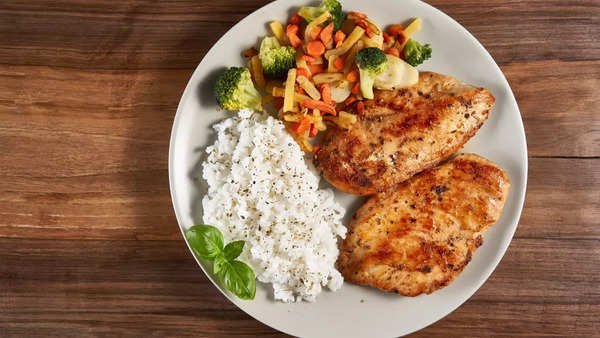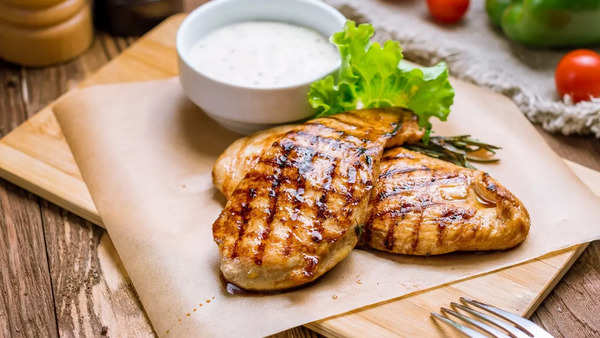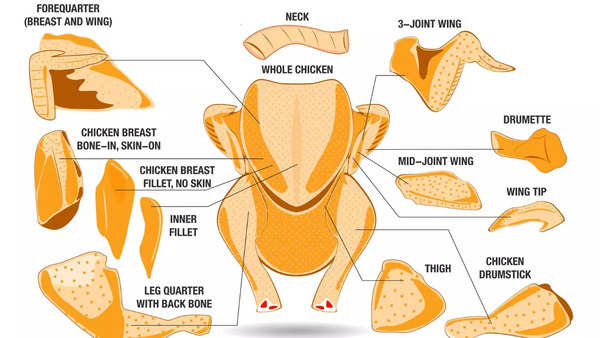ALSO READ: How much protein does chicken have and can it improve a protein deficiency?
High Protein Content
Chicken breasts are renowned for their high protein content, making them a great choice for muscle growth and repair. A 100-gram serving of cooked chicken breast provides about 31 grams of protein. Protein is vital for muscle repair and growth, especially after intense workouts. The amino acids in protein act as building blocks for muscle tissue, helping with recovery and hypertrophy.
Low fat
Chicken breasts are low in fat, especially saturated fat, compared to other meat sources. A 100-gram serving contains about 3.6 grams of fat, and less than 1 gram of saturated fat. This low-fat profile makes chicken breast a heart-healthy choice and helps maintain a lean physique, which is beneficial for muscle definition.
ALSO READ: Chicken breasts or thighs, which is healthier?
Rich in vitamins
Chicken breasts are a good source of essential vitamins, including B vitamins such as niacin (B3), pyridoxine (B6), and riboflavin (B2). These vitamins play a key role in energy metabolism, helping the body convert food into energy, which is essential to fuel intense workouts and promote muscle growth.

Packed with Minerals
Minerals such as phosphorus, selenium, and potassium are abundant in chicken broth. Phosphorus is vital for bone health, selenium acts as an antioxidant that protects cells from damage, and potassium helps maintain fluid balance and muscle contractions. These minerals support overall health and physical performance.
ALSO READ: 4 side effects of eating chicken daily that you need to know about
Low in calories
For those aiming to build muscle without gaining too much fat, chicken breast is a great choice. A 100 gram serving contains about 165 calories, making it a low-calorie, nutrient-dense food. This allows a higher protein intake without exceeding the daily caloric requirements, which are essential for muscle building and fat loss.

Zero Carbohydrates
Chicken breasts contain no carbohydrates, making them suitable for low-carb and ketogenic diets. These diets can be effective in building muscle when combined with adequate protein intake, as they encourage the body to use fat as its main source of energy, preserving muscle mass.
ALSO READ: What type of chicken is best for weight loss.
Source of Leucine
Leucine (BCAA) is a branched chain amino acid essential for muscle protein synthesis. Chicken breasts are rich in leucine, which helps stimulate muscle growth and recovery after exercise. Leucine-rich foods such as chicken breast can improve muscle protein synthesis, promoting greater muscle gains.

Easy to Depreciate
Chicken breast is a highly digestible source of protein, making it easier for the body to absorb and use the amino acids for muscle repair and growth. This is especially beneficial after workouts when the body needs quick and effective sources of protein to start the recovery process.
ALSO READ: Is it healthy to eat chicken daily? Here is the answer!
Versatile and Easy to Prepare
Chicken breasts are extremely versatile and can be prepared in a variety of ways to suit different tastes and dietary preferences. Grilling, baking, poaching and stir-frying are popular methods that retain the nutritional value while providing delicious, lean protein options. This versatility ensures that incorporating chicken breast into your diet remains enjoyable and sustainable.

Supports Weight Management
Including chicken breast in a balanced diet can help with weight management. The high protein content promotes satiety, reducing total calorie intake by curbing hunger. Maintaining a healthy weight is essential for muscle definition and overall fitness, making chicken breast an ideal part of a muscle building diet.
Do you want to know how chicken breast helps to build muscle? Look…
Muscle Repair and Growth
The main advantage of chicken breast in building muscle is its high protein content, which is essential for the repair and growth of muscle tissue. After intense workouts, muscle fibers experience micro-tears that must be repaired for growth. The amino acids in chicken breast provide the necessary building blocks for this process, resulting in stronger and bigger muscles.

Improves Recovery
Chicken breast is rich in essential amino acids, especially leucine, which plays a significant role in muscle recovery. Eating chicken breast after a workout can speed up the recovery process, which will reduce muscle soreness and allow for more frequent and intense training sessions.
Supports Metabolism
The B vitamins found in chicken breast, such as niacin and vitamin B6, are vital for energy metabolism. These vitamins help convert food into energy, ensuring that the body has the necessary fuel for both workouts and muscle recovery. A well-functioning metabolism is key to maintaining energy levels and promoting muscle growth.
Keeps Lean Muscle Mass
The low-fat, high-protein nature of chicken breast makes it ideal for those looking to build lean muscle mass without gaining too much fat. Maintaining a lean physique is essential for muscle definition and overall fitness. The low calorie content also allows for a higher protein intake without exceeding daily caloric needs.
How to make Chicken Kolkata Style
Easy to incorporate into the diet
The versatility of chicken breast makes it easy to incorporate into different meals, ensuring that your diet remains varied and enjoyable. This is important for long-term adherence to a muscle-building diet. Whether grilled, baked, or stir-fried, chicken breast can be adapted to suit different cooking preferences and nutritional needs.
Balanced Nutritional Profile
In addition to protein, chicken breast provides essential vitamins and minerals that support overall health and physical performance. Phosphorus and selenium, for example, are important for bone health and immune function, respectively. A well-balanced diet that includes chicken breast ensures that you get a balanced nutrient intake that supports muscle building and overall well-being.
Lowers Inflammation
Chicken breast contains selenium, an antioxidant that helps reduce inflammation in the body. Lower inflammation levels can improve recovery times and reduce the risk of injury, which is critical for consistent muscle growth and overall fitness.
Promotes Satiety
The high protein content of chicken breast promotes feelings of fullness and satiety, reducing the likelihood of overeating and helping with weight management. Maintaining a healthy weight is important for muscle definition and overall fitness, making chicken breast a valuable addition to a muscle building diet.
Improves Strength
Regular consumption of chicken breast can contribute to increased muscle strength. The protein and essential amino acids support muscle repair and growth, leading to greater muscle mass and strength over time. This is particularly beneficial for athletes and those engaged in strength training.
Improves Overall Health
Besides building muscle, the nutrients in chicken breast contribute to overall health. The B vitamins support energy metabolism, the minerals support bone health, and the low-fat content promotes heart health. A diet that includes chicken breast ensures that you get a range of nutrients that support both physical performance and overall well-being.
ALSO READ: What is the best way to cook a chicken breast to perfection
(Images courtesy of iStock and Canva)